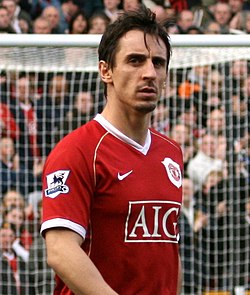
Introduction
Gary Neville, a name synonymous with English football, holds significant importance in the sport’s history and contemporary discourse. As a former professional player, he dedicated his career to Manchester United, where he became a fan favourite for his unwavering commitment and skill on the pitch. Today, he has transitioned from player to pundit, influencing football analysis and discussions in the media.
Football Career Highlights
Born on February 18, 1975, in Bury, England, Gary Neville made his way through the youth system at Manchester United, making his first-team debut in 1992. He went on to become one of the most successful right-backs in Premier League history, amassing numerous accolades including eight Premier League titles, three FA Cups, and two UEFA Champions League trophies.
Over his 19-year career at Manchester United, Neville made over 600 appearances, earning a reputation for his defensive prowess and leadership qualities, eventually serving as club captain. Post-retirement in 2011, Neville was inducted into the English Football Hall of Fame, cementing his legacy within the sport.
Media Influence and Punditry
Transitioning from the pitch, Neville took up a role as a football pundit, where his insights have become highly respected. Known for his candid commentary and analytical approach, he contributes to various platforms including Sky Sports and has appeared on international broadcasts, especially during major tournaments.
In recent months, Neville has been vocal about the state of football, focusing on issues such as the role of VAR, the impact of financial fair play regulations, and the importance of grassroots football. His viewpoints have sparked discussions among fans and analysts alike, reflecting his deep understanding of the game.
Off the Pitch: Business Ventures and Charity Work
Outside of football, Neville has ventured into the business world, co-owning several establishments, including hotels and a popular soccer training facility. His entrepreneurial efforts signal a commitment to enriching communities and promoting football development.
Additionally, Neville is known for his charitable works, supporting various initiatives aimed at improving youth engagement in sports and providing opportunities for underprivileged children.
Conclusion
Gary Neville’s journey from a Manchester United icon to a prominent media personality illustrates the enduring impact of athletes beyond their playing days. His continued involvement in football discourse highlights not only his passion for the game but also the responsibility that comes with being a public figure. As the football landscape evolves, Neville remains a pivotal voice, advocating for positive changes and fostering the sport’s future growth.
You may also like

The Exciting Location of Super Bowl 2024: What to Expect

Jack Willis: The Rising Star of English Rugby

The Rise of Harvey Elliott in Football
SEARCH
LAST NEWS
- Remembering Wendy Richard: The Promise to Co-Star Natalie Cassidy
- How Did Anglian Water Achieve an ‘Essentials’ Rating for Mental Health Accessibility?
- Shai Hope Leads West Indies in T20 World Cup Clash Against South Africa
- What We Know About Weston McKennie: Future at Juventus and Past at Leeds
- What We Know About the Upcoming Live Nation Antitrust Trial